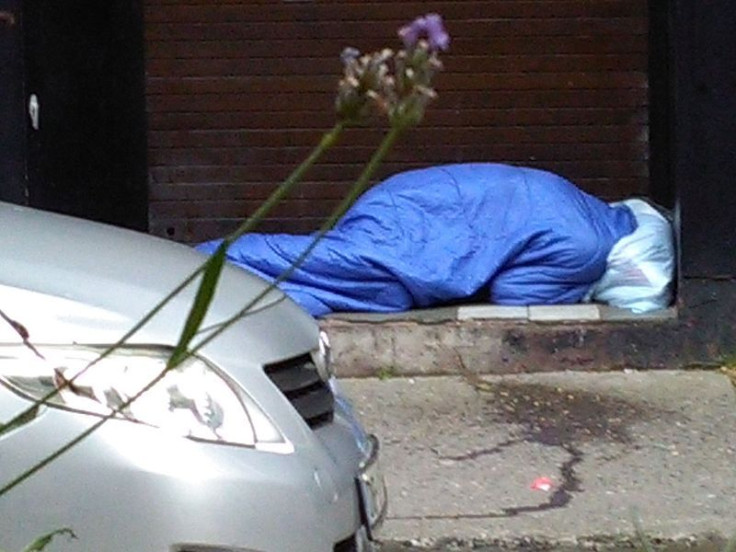Ireland Grappling With Homeless Crisis As Election Nears End

KEY POINTS
- Some 10,000 people are homeless in Ireland.
- Dublin faces a housing shortage and rising rents
- Prime Minister Leo Varadkar has been criticized for not tackling homelessness
As the Republic of Ireland votes in a new government, the country is dealing with a serious homeless problem.
Although Ireland recorded a 7% drop in homelessness in December 2019, much of that decline was attributed to efforts by the Peter McVerry Trust, a national housing and homeless charity, which got more than 700 people off the streets of Dublin prior to Christmas.
As of December, 9,731 people were homeless in Ireland. Of that amount, an estimated 4,000 were children.
"The drop of almost 7% is one of the largest monthly decreases recorded for the official homeless figures which have been published on a monthly basis since April 2014," said Pat Doyle, CEO of the Trust. "
The country’s Department of Housing, Planning and Local Government reported that 5,971 people exited homelessness in 2019, a 16% jump from the prior year.
Officials at the Department of Housing said the decrease in homelessness could be explained by a 49% increase in local authority housing units last year.
Brendan Kenny, assistant chief executive of the Dublin City Council, said he was hopeful that the increase in homelessness typically witnessed during January and February can be avoided this year.
However, the Dublin Regional Homeless Executive, or DRHE, a local government agency, painted a bleaker picture of the homeless problem.
DRHE reported that 222 homeless people died in Ireland over the last four years.
"The system is in turmoil and those who operate it are in denial,” said Inner City Helping Homeless chief and Dublin City Councilor Anthony Flynn.
Since a real estate crash of 2008, rents in Dublin have soared by nearly 40%.
Moreover, the life expectancy for homeless people in Ireland currently stands at 42 for men and just 37 for women – versus an 81 average life expectancy for the general population.
Megan Nolan, an Irish writer based in London, thinks homelessness in Ireland is far worse than government figures indicate and, in fact, has reached a “crisis point.” She cited the untold numbers of people living in illegal squats and women in shelters.
Nolan also criticized ordinary Irish for their hostile attitude towards the homeless.
“When I lived in Dublin, I was shocked by just how many people spoke about the homeless people they walked past every day with disdain,” she wrote. “Of course, many kind people live in Dublin, who help whenever possible, but many more are not just unmoved by but actively vitriolic towards the homeless.“
Homelessness, along with related issues of a housing shortage and rising rents, gave dogged Irish Prime Minister Leo Varadkar during the election. campaign
Micheal Martin, leader of the opposition Fianna Fail party blamed Varadkar and his ruling Fine Gael party for the 60% increase in homelessness in Ireland over the three years since the last government was formed.
During the election Varadkar was widely condemned for comments he made about a homeless man who suffered injuries after heavy machinery struck him while sleeping in a tent near the Grand Canal in Dublin.
Although Varadkar expressed sympathy for the injured man, he also appeared to brush off the topic and pushed responsibility for the matter to local authorities like Dublin City Council and Waterways Ireland, the agency that manages inland navigable waterways.
Varadkar also shifted blame for the injured homeless man onto the Lord Mayor of Dublin, Paul McAuliffe, a member of the opposition Fianna Fail.
“I think it's reasonable that the Lord Mayor of Dublin who is politically accountable for Dublin City Council, should also make a statement,” Varadkar said.
In response, Fianna Fail leader Martin said it was "extraordinary" that Varadkar would ask the Lord Mayor of Dublin to make a statement.
“That is extraordinary, that the Taoiseach [Prime Minister] would call on the Lord Mayor to make a statement about some terrible tragedy like that,” he said.
McAuliffe himself said he was “disappointed the Taoiseach went down this road.”
“A man was seriously injured and yet [Varadkar] appeared to be more interested in apportioning blame to someone else,” he said. “There may be an election ongoing at… present but a human being has been seriously injured this morning. It seems that the Taoiseach’s first thought was to play a political game.”
Sister Stanislaus Kennedy, a prominent Irish nun and advocate for the homeless, also described homelessness in the country as a “crisis.”
Kennedy believes that the Irish government could have solved the homelessness problem as far back as the 1980s.
“I can remember in 1987, which was the International Year of Homelessness, predicting that within the following six or seven years, we could have eliminated long-term homelessness,” she said. “It could have happened, except that the government reneged on its commitment to provide houses. And so, over time, the homeless population grew and grew and grew, until now, it is way beyond crisis. Now, there are 10,000 people who are homeless. When there were 4,000 people who were homeless, some years ago, we said it was a crisis. It is an absolute disaster, it is horrendous and it is fundamentally wrong.”
© Copyright IBTimes 2024. All rights reserved.





















